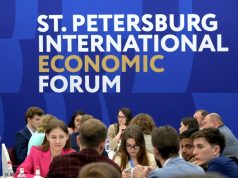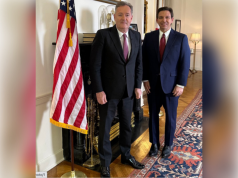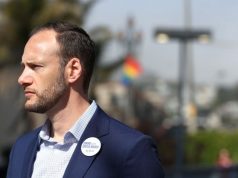On May 21, EU Ambassador to Georgia Carl Hartzell spoke to members of the European Business Association about the challenges facing the country in the light of the pandemic, adding that despite the difficulties, Georgia enjoys the strong support of the European Union today. He said a true friend was can be recognized in bad times and that the EU was a true friend of Georgia: ”I want to talk about what we have done in the recent weeks and the last two months. During this period, we have seen three important support packages – about 250 million euros allocated to Georgia in the form of grants. These are new grants and new funding …”
According to the EU Ambassador, the financial assistance that Georgia receives regularly is important in terms of strengthening cooperation with civil society in order to achieve the support for the so-called vulnerable groups (“Vulnerable” groups also include sexual minorities): “I do not want to make comparisons, because the European Union is a global player who does not want to make comparisons between countries, but I can say that Georgia has the high support of the European Union per capita. This is a great achievement of the Georgian government”.
For note: In the wake of the global economic crisis caused by the pandemic, Georgia has received several hundred million euros from the European Union, the World Bank and various Western financial institutions. The ruling party calls it unselfishly friendly assistance from strategic partners and tries to convince the public that the country will not make any commitments in return, but, the recent developments, especially the EU threat – if you do not release Ugulava and Okruashvili, Georgia will not receive any “help” – made obvious many things. It has become clear that the millions declared by the government as unselfish aid are ordinary bank loans, in exchange for which the country undertakes financial, political, ideological and legal obedience to the West …
What political fees will Georgia pay today in exchange for the “assistance” provided by the West, and what difficulties will the multimillion-dollar loans received on the background of the pandemics, create to the country in the future? Independent human rights defender Dimitri Lortkipanidze talks to “Georgia and the World” on these topics
– Mr. Dimitri, if we believe the statement made earlier by EU Ambassador Carl Hartzell, today Georgia has one of the largest EU support per capita in the world. He said that this support is manifested in multimillion-dollar financial and not only financial assistance. Is this assessment real and what does this help really do?
-, Everything should be confirmed only by facts, but a fact is stubborn. As you know, the process of Georgia’s European integration began in 1999, when we became a member of the Council of Europe and made some commitments that often contradicted our organic interests. For example, this was the problem of the so-called Turkish Meskhetians, which the Council of Europe forced us during the years to resolve, then was our commitments within the scopes of the western partnership program, which implied adoption of the “Liberal” politics-based legal frameworks in the directions of the alienation of land to foreigners, migration, and anti-discrimination legislation. Interestingly, in the light of these processes, I mean European integration, Numerous top-ranking European officials, including European Commissioners were often visiting Georgia, assuring our people that no one enforces Georgia in making decisions, and that the country was not making any commitment by force. By the way, at the preparatory stage of the Association Agreement, the European Commissioners were also visiting the Patriarchate, and even then the similar statements were made. What was really going on? There was a kind of informational processing of the society so that people would not have questions and there would be no distrust of the process, which existed objectively.
And, what have we got now? We have found that Georgia has, in fact, found itself in the financial, political, and, most importantly, ideological captivity of Western neoliberal forces. This has been particularly pronounced in the area of legislative change. I will no longer list specific changes, because we all know what laws have been passed in recent years. Against the background of all this, the fact that practically indefinite power was given to the so-called third sector, turned out to be no less dangerous for the state. . I say nothing about the fact that t new sources of funding have emerged in the country from the European structures, the vanguard of which is still the Soros Foundation.
As for the particular support and assistance mentioned by Mr. Hartzell, first and foremost we need to know that there is no such thing as assistance. These are ordinary loans that are given to us in exchange for the most hard and difficult ideological and political obligations. Simply put, this is an expression of a non-governmental, harmful political practice, as a result of which Georgia’s foreign debt has already exceeded $ 22 billion. Nobody is talking about it today, and this is a deliberate policy, and in the light of these debts, we all see the shameful, slavish situation of the Georgian government with the West.
– In the context of the global economic crisis caused by the pandemic, the issue of developing local production is relevant for us, too, but economic experts say that the country will not be able to do this without international financial assistance. Can the multimillion-dollar loans that the European Union provides to Georgia be useful for the industrialization of the country?
-, Let me tell you directly that behind every loan or credit given to us by the largest Western financial institutions, be it the World Bank or the European Bank for Reconstruction and Development or any other financial organization, there are obligations that leave no chance for Georgia to develop its industry under the global agenda. Moreover, there is such a person – Dimitar Bogov – IBRD Chief Economist of Eastern Europe and the Caucasus region, who was previously asked what he thought about Georgia’s development of local production in the post-coronavirus period. He said without any diplomatic scrutiny that this is not a rational proposal, i.e. it will jeopardize the process of globalization, and in the case of Georgia, it is not advisable to consider such a proposal. This post is on the Internet and anyone who is interested can search for my Facebook resource.
-, It turns out that the development of local production in Georgia and in all other similar countries is already facing insurmountable resistance. What chances do we have in these conditions?
-, The first and foremost is that Georgia has significant agricultural resources. We can also produce wheat and it will be a really serious step forward for the country. Although there is potential, it is a fact that Georgia today depends on wheat imported from abroad. This is what I mean when I talk about placental connections with Russia, and some people then manipulate this topic. Well, I wonder and ask our government: why does Georgia produce only 10% of the amount of wheat we can produce today? Why are we 90% dependent on imports? I ask Mr. Levan Davitashvili: Why don’t you vote for it? Or why don’t our experts, members of parliament, the chairman of the Agrarian Affairs Committee, the vice-speakers answer to us? Georgia is a country of agriculture – Georgia, which has historically had a commitment to fulfill its agrarian function and huge potential. By the way, during the Soviet Union we supplied various products to the largest cities, and this was the main lever driving the Georgian economy. For example, St. Petersburg was completely supplied with Georgian food products. We had about 200 varieties of wheat, including endemic varieties. I am not saying that poultry and livestock were developed at the highest level; There were about 10 million cattle across the country; We produced essential oils for Europe’s leading cosmetology brands; 135 thousand tons of apples were made only in Gori district …
I repeat: why is there no question of reviving all this today? Why aren’t discussions and talks going on about this?
– What is needed for the country to slowly get out of this situation and more or less get rid of the influence of external forces hindering economic independence?
– I will not say anything new if I answer that all this, first of all, needs political will, but, unfortunately, as time goes on, it is obvious that the political leadership of Georgia does not have this will. This is the primary reason why we are, in fact, today a colony of the West and a springboard for Anglo-Saxon globalist interests.
As for the solution, we need a foreign policy that crosses American and Russian, or Eurasian, and NATO interests in this geographical area, but as long as the country is a Western political toy that no one knows what purpose they will find tomorrow, talking is superfluous. The West is a global geopolitical player that forces to drown in debt the countries like we are and, eventually makes them a default Candidates. Default’s candidacy, for a clear example, is Greece’s disintegration, beginning with the fragmentation and disintegration of the Church and ending with an artificial economic crisis. This is a proven method that will inevitably touch us, if, I repeat, we do not make serious adjustments in foreign policy in the near future and do not fundamentally change the state policy.
Interviewed by Jaba Zhvania








